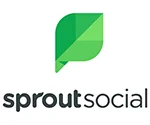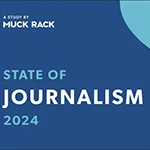 |
Influencers are playing an increasingly central role in the social marketing playbook for brands, according to newly released research from Sprout Social, a provider of social media management software.
More than eight in 10 (81 percent) of the 307 US-based social marketers surveyed by Sprout called influencer marketing “an essential part of their social media strategy.”
A large majority of those social marketers noted the positive effect that influencer marketing has. More than half of them (55 percent) said that influencer marketing had either a “high” or “very high” impact on brand awareness, while 58 percent said the same about its impact on customer loyalty. Just two percent said that it had no impact at all on brand awareness, with only three percent saying that it did not affect customer loyalty.
More than three-quarters (76 percent) also agreed or strongly agreed that using influencers impacts a brand’s connection with customers “in ways other social marketing efforts cannot.”
“Expanding brand reach to new audiences” (68 percent) was the most-often-cited plus offered by influencer marketing. Boosting engagement rates on social platforms (50 percent), enhancing brand authenticity and trust (47 percent) and strengthening brand loyalty among existing customers (45 percent) were also frequently noted benefits.
When it comes to which platforms social marketers focus on for their influencer-related efforts, Instagram is the big winner, with 86 percent of survey participants saying that they partner with influencers there. Facebook (78 percent), Tik Tok (70 percent) and You Tube (67 percent) were next in line.
However, influencer marketing does come with its challenges, the survey respondents said. Top among those: “finding the right influencers,” cited by 65 percent. Other hurdles include measuring the effectiveness of an influencer campaign (47 percent) and managing the brand/influencer relationship (46 percent).
As far as footing the bill for influencer efforts goes, 73 percent of respondents say that at least part of that is included in the brand’s overall social media budget, with 50 percent noting that it at least partly falls under the “content creation” umbrella and 47 percent allocating resources from their paid media budget.
“Our research reveals that brands are realizing the necessary role influencers play in reaching new and growing audiences, and those who effectively implement it into their existing social and marketing strategies will be better able to compete and drive lasting business impact,” said Sprout Social CMO Jamie Gilpin.
Sprout’s study was conducted between Aug. 16 and 21.


 Consumers who once demanded convenience now require consistent, multi-channel experiences that cater to them at every point. Brands must have a clear, audience-appropriate, and channel-specific voice across all platforms.
Consumers who once demanded convenience now require consistent, multi-channel experiences that cater to them at every point. Brands must have a clear, audience-appropriate, and channel-specific voice across all platforms. Employees at U.S. companies are experiencing high levels of burnout, but managers are lagging behind when it comes to their awareness of the problem
Employees at U.S. companies are experiencing high levels of burnout, but managers are lagging behind when it comes to their awareness of the problem Brand has a powerful effect on a company’s valuation, but the level of brand understanding in the investment community leaves a lot to be desired, according to a new study from Brodeur Partners, Interbrand and NewtonX.
Brand has a powerful effect on a company’s valuation, but the level of brand understanding in the investment community leaves a lot to be desired, according to a new study from Brodeur Partners, Interbrand and NewtonX. AI may still be viewed with a wary eye by most media pros, but its use is growing, according to a new study from Muck Rack.
AI may still be viewed with a wary eye by most media pros, but its use is growing, according to a new study from Muck Rack. A new study from Walker Sands says that some marketers have been putting the cart before the horse when it comes to the relationship between marketing channels and business outcomes.
A new study from Walker Sands says that some marketers have been putting the cart before the horse when it comes to the relationship between marketing channels and business outcomes.


 Have a comment? Send it to
Have a comment? Send it to 
No comments have been submitted for this story yet.